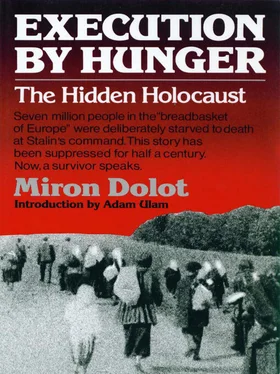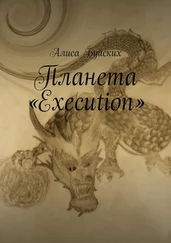The results were catastrophic. The combination of lack of care and disease that struck during the winter months killed hundreds of horses in our village. A serious problem then developed for the officials of the collective farm, for horsepower still determined agricultural production. It was this problem that brought about the Horse Campaign in our collective farm.
A rumor was circulated the day prior to the meeting that Comrade Cherepin, having returned from the county Party conference, had important news to communicate to the members of the collective farm. The stablemen predicted that this meeting would have something to do with horses. They ventured this guess because Comrade Cherepin had made an inspection of the horses immediately upon his return from the conference.
The former church was again the meeting place. When Mother and I arrived, the meeting was already in progress, and the hall was filled to capacity. The speaker, of course, was Comrade Cherepin.
The same words and slogans flowed from his mouth uninterruptedly. He exalted the class struggle, and the world proletarian revolution in a deluge of words. These were his favorite harangues which he juggled expertly while the audience waited for the main show to begin. After an hour or so, Comrade Cherepin finally changed topics and touched on his main point.
Reminding us all that the Soviet Union should overtake the capitalists countries of the entire world, especially the United States of America, he pointed out that horses carried hope for the future. The reason that led to the substitution of the word “horses” for “tractors,” on which high hopes had been placed in the most recent tirades, had been determined at high Party levels. Zig-zags like this were not explained to the farmers.
“Horses, comrades, horses, and more horses,” Comrade Cherepin shouted. “Our dear Fatherland is in want of horses; and our beloved Communist Party demands horses!” He stopped for a moment. Then, staring at his audience, he pronounced slowly but clearly, through clenched teeth: “We need more and better horses, comrades! This is our watchword at the present time.”
The new watchword, however, had been placed in the old familiar straitjacket of doctrinal haranguing. Only a few weeks before, Comrade Cherepin had predicted prosperity for the present and coming generations if the members of the collective farms would “increase the fertility of the pig stock.”
Another time, speaking about the “productivity of the cow,” he stressed that if the farmers would solve the “milk problem”—and they had better solve it, or else!—the Soviet Union would become a country “of rivers flowing with milk and honey.”
During previous meetings, the villagers managed a sympathetic blankness which dissolved after the meeting ended, when the listeners erupted into laughter or criticism, depending on the individual.
The absurdity of the “horse speech” was no different from that of other speeches. That horses were valuable in agricultural endeavors was recognized everywhere and by everyone. But, no member of the collective farms (to whom Comrade Cherepin was speaking) owned his own horse. They had all been collectivized. Now Comrade Cherepin’s outburst suggested that the farmers should immediately produce more horses in some way. At least, this was how we understood him.
“We must solve the horse problem!” Comrade Cherepin reiterated. “And speaking dialectically, in order to have horses, one must at first have colts. Our future, comrades, depends on horses, for on horseback we’ll reach our goals more easily and quickly!”
That was something to digest and to wonder about. None of us, of course, knew what the word “dialectically” meant. So this point was lost for us; for me, at least. But the second part of his statement was clear. All of us knew how to ride a horse. I even imagined Comrade Cherepin on horseback chasing the “goal.” But, what was he trying to tell us?
In a lower voice, after a pause that he apparently gave to allow the importance of his statement to penetrate our minds, Comrade Cherepin continued:
“But, comrades, even this branch of our society has not been immune from the destructive power of our class enemies. This, the most vital factor in our existence became infested by the counterrevolutionary activities of the capitalist elements.”
Pains of fear became pains of pity as attention fell on the stablemen. They were being blamed and doomed.
The voice of Comrade Cherepin boomed again, and the audience came to attention, each hiding behind the back of his fellowman.
“That the enemies of the people are at work in our kolhosp is an established fact. How many colts are there in our stables? You don’t even know! And how many are to be born in the near future? Can you tell me?” He paused for a second. “No, you cannot!”
The audience sat in silence. Everybody now tried to avoid showing any sign of emotion. Immoderate display of feelings, for any reason, had been “rewarded” handsomely in the past. Now, facing Comrade Cherepin as he was throwing out accusations about the “low fertility of the kolhosp mares,” the villagers sat speechless.
“Fifteen!” he shouted. “There are only fifteen colts on the entire collective farm!”
Comrade Cherepin’s ignorance of agriculture and its vocabulary, now caused a situation which was absurd to the villagers but pitiful and tragic to his victims. Tossing around human terms while referring to the mares in the kolhosp stables, he asked how many of them were pregnant. The senior stableman to whom the question was addressed guffawed at the misuse of the word “pregnant.” This was something unusual. The people had been conditioned to listen to Party dignitaries with the same attention once accorded the priest.
As the senior stableman laughed, Comrade Cherepin glanced at him, and then at the audience. He then deliberately took a drink of water. The stableman hesitated; his mirth disappeared quickly under the murky stare of the Party boss. He began to realize the gravity of the situation, but it was too late.
“You are laughing,” Comrade Cherepin sneered at him. “To you, it is funny. My words amuse you. The words of the Party and government amuse you!” His voice was rising in anger. His eyes gleamed with fire.
The pale-faced stableman, searching for a way out of his dilemma, tried to say something. Raising his hands, he mumbled, “I…I only wanted to say that…”
“I am still a Party and government representative here,” shouted the enraged Cherepin. Realizing that he was fighting for his very life, the stableman squeezed in a short apology before Comrade Cherepin could again shout him down.
“I laughed only because mares cannot possibly be called ‘pregnant’ only women…. The mare is with foal!”
The stableman did not quite finish what he wanted to say. He probably could not find just the proper word. However, he again apologized for his “childish behavior,” denied that he had laughed on purpose, and asked forgiveness for having interrupted such a worthy and patriotic speech.
When he finished his plea, he gazed with frightened eyes around him for some sort of help. The villagers all had their eyes riveted on Comrade Cherepin, and the accused was left pitifully alone. The audience remained silent, waiting for Cherepin to continue.
“As you see, comrades,” Comrade Cherepin finally broke the silence, “the event which has just happened is an excellent example of what Comrade Stalin—” A loud and prolonged applause interrupted him.
“Comrade Stalin—” Somebody started to applaud again, but he ignored him, and continued:
“…Comrade Stalin describes as the class enemies’ sally.”
He deliberately paused, looking complacently at the audience. Then his eyes turned again to the senior stableman.
Читать дальше












